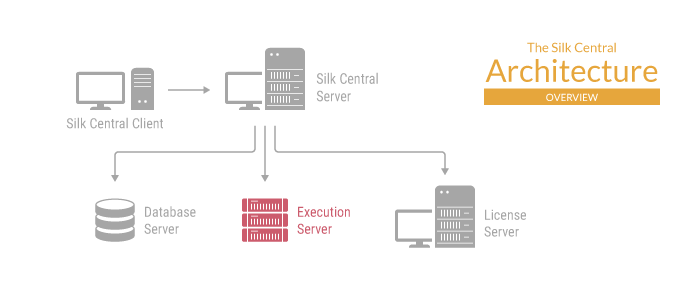Installing Execution Servers

Execution Server
The execution server executes automated tests that are scheduled by authorized users. Users are responsible for the proper configuration of execution servers and additional resources that are required for test executions. The system allows for the installation and configuration of multiple execution servers working independently of one another. The execution server uses port 19124 for the default instance. For secure connections with SSL, the server also uses port 19125.
Agent Computers:
- Silk Performer Agents
- Silk Performer agent computers host the virtual users that are run during load tests. As many agent computers as necessary can be added to a Silk Performer project so that the required quantity of virtual users can be run. Configuration of agents is done through Silk Performer. Refer to the Silk Performer documentation for details on configuring agents.
- Silk Test Classic Agents
- The same rules that apply to Silk Performer agents apply to Silk Test Classic agents, except Silk Test Classic agents host Silk Test Classic tests.
Execution Server Requirements
The actual requirements and prerequisites for execution servers depend on the application under test (AUT) and the type of testing.
For load testing, refer to the environment requirements of Silk Performer. Running load tests with the minimal configuration can result in inaccurate results.
For functional testing, refer to the environment requirements of Silk Test. We recommend a minimum of 2048 MB main memory for intensive testing, such as Web browser replay.
The Linux execution server requires the latest version of Java Runtime Environment 1.8.
Executing Silk Performer using Execution Servers
- Silk Performer 19.5 or later includes a separate JRE for the Silk Performer execution.
- To execute
Silk Performer using a different JRE, add the path to the JRE as a
JREPath tag to the
SccLtcVersionsConf.xml file. For example:
<JREPath>C:\Program Files (x86)\Java\MyJre8.0</JREPath>
Note: The JRE specified in the JREPath tag must be a 32-bit JRE. - The full path of the JREPath tag in the SccLtcVersionsConf.xml file is CoreVersions > Entry > JREPath.
- When using the Execution Server Launcher for Silk Performer execution, Silk Performer 19.5 must be installed in the default directory C:\Program Files (x86)\Silk\Silk Performer 19.5. Changes to the SccLtcVersionsConf.xml file are overwritten by the Execution Server Launcher on each execution server restart.
There is no dependency between any installed JRE and the internally used JRE libraries, except if you require an execution server to run in 32-bit mode. To start the execution server in this case, you need to use the Execution Server Launcher or the Execution Server Package and your own installed 32-bit JRE. By default, execution servers are running in 64-bit mode.